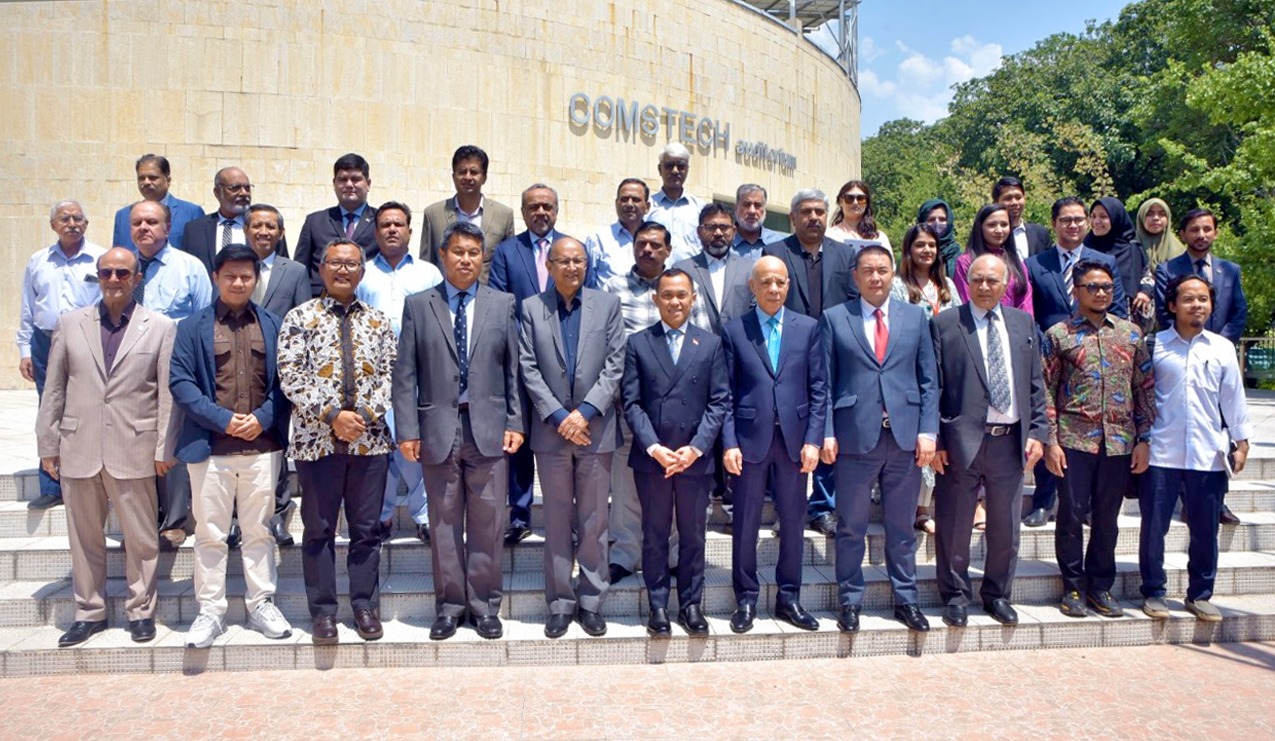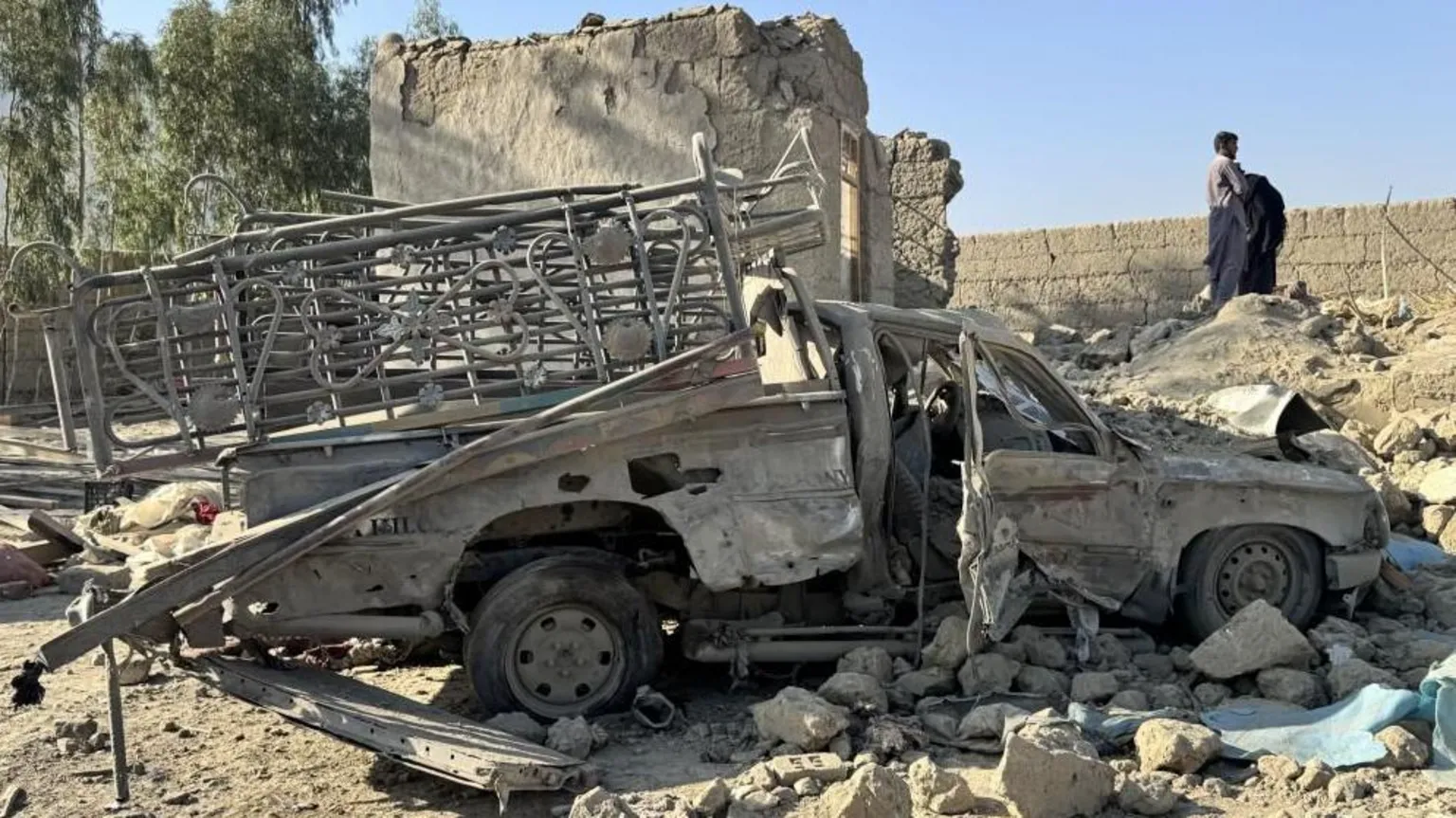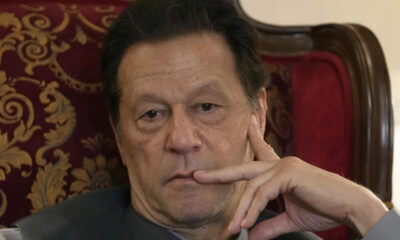Pakistan News
Indonesian Embassy and COMSTECH host the International Seminar on the Sustainability of Palm Oil Industry and its Derivative Products

Islamabad (Bilal Javaid):– The Embassy of the Republic of Indonesia in Islamabad, in collaboration with COMSTECH, organized the International Seminar on the sustainability of the Palm Oil Industry and its Derivative Products at COMSTECH Auditorium, Islamabad, Pakistan.
The seminar aims to raise awareness of the sustainability of palm oil from Indonesia to the Pakistani public and maintain the awareness that palm oil and its derivative products are not harmful to health but beneficial for well-being. This seminar has more potential to explore the untapped potential of palm oil derivatives beyond culinary applications.
In his remarks, COMSTECH Adviser Prof. Dr. Syed Khurshid Hasnain mentioned that COMSTECH has a commitment to supporting the natural products coming from the OIC member countries and expects more applied research on more application of natural products for industrial purposes that could benefit the OIC member countries. He believed that science and technology should be applicable and give more economic benefits to the people.
In his turn, the Indonesian Chargé D’ Affaires (CDA) Rahmat Hindiarta Kusuma underlined the importance of palm oil for Indonesia as it contributes 4.5 percent to the GDP, which absorbs more than 17 million direct and indirect workers. Given its significance, the Government of Indonesia successfully improved the approaches to palm oil production to be more eco-and-labor-friendly.
Please keep up with the Indonesian palm oil in our bilateral trade relations and let us make it a milestone to improve trade volumes between the two countries, CDA said, inviting the Pakistani business community to participate in Trade Expo Indonesia 2024 this October.
The seminar discloses the minerals contained in palm oil are very beneficial for the industry, compared with other vegetable oils, and could be used for raw materials of cosmetics, daily appliances, pharmaceuticals, paints, plastics, and even biofuel. Palm oil is also considered very efficient in cost since it provides a high yield at a very affordable price.
The seminar also showcases the scientific and academic research about the health benefits for palm oil consumers’ reveals that palm oil from Indonesia has sustainable farming standards by putting human rights, deforestation, and the environment as the core of the production process, even contributes to the fulfillment of the Sustainable Development Goals.
The speakers of the seminar are Prof. Dedi Budiman Hakim, Bogor Agricultural Institute; Mr. Rashed Jan Muhammad, President BQATI; Prof. Muhammad Asim Shabir, University of Faisalabad; Mr. Djono Albar Burhan, Indonesia Palm Oil Association; Dr. Humaira Fatima, Quaid-e-Azam University; and Mr. Shahid Pervez, Secretary General of PVMA.
Significant figures of participants from entrepreneurs, scholars, students, and journalists in Pakistan attended the seminar. All participants received goodie bags from Indomie Pakistan. The world’s largest instant noodle brand in Faisalabad, Pakistan, is also a palm oil-based product.
The government of Indonesia and COMSTECH have a successful history of collaboration in advancing science and technology among the OIC member countries. The COMSTECH research fellowship program in virology and vaccine technologies has been held annually since 2022. Both parties are planning to co-organize an exhibition focusing on nutraceuticals and cosmetics made with natural and halal ingredients later this year.

Pakistan News
Pakistan launches strikes on Afghanistan, with Taliban saying dozens killed

Pakistan has carried out multiple overnight air strikes on Afghanistan, which the Taliban has said killed and wounded dozens of people, including women and children.
Islamabad said the attacks targeted seven alleged militant camps and hideouts near the Pakistan-Afghanistan border and that they had been launched after recent suicide bombings in Pakistan.
Afghanistan condemned the attacks, saying they targeted multiple civilian homes and a religious school.
The fresh strikes come after the two countries agreed to a fragile ceasefire in October following deadly cross-border clashes, though subsequent fighting has taken place.
The Taliban’s defence ministry said the strikes targeted civilian areas of Nangarhar and Paktika provinces.
Officials in Nangarhar told the BBC that the home of a man called Shahabuddin had been hit by one of the strikes, killing about 20 family members, including women and children.
Pakistan’s Ministry of Information and Broadcasting said it had carried out “intelligence based selective targeting of seven terrorist camps and hideouts”.
In a statement on X, it said the targets included members of the banned Tehreek-i-Taliban Pakistan, which the government refers to as “Fitna al Khawarij,” along with their affiliates and the Islamic State-Khorasan Province.
The ministry described the strikes as “a retributive response” to recent suicide bombings in Pakistan by terror groups it said were sheltered by Kabul.
The recent attacks in Pakistan included one on a Shia mosque in the capital Islamabad earlier this month, as well as others that took place since the holy month of Ramadan began this week in the north-western Khyber Pakhtunkhwa province.
Pakistan accused the Afghan Taliban of failing to take action against the militants, adding that it had “conclusive evidence” that the attacks were carried out by militants on the instructions of their leadership in Afghanistan.
The Taliban’s defence ministry later posted on X condemning the attacks as a “blatant violation of Afghanistan’s territorial integrity”, adding that they were a “clear breach of international law”.
It warned that “an appropriate and measured response will be taken at a suitable time”, adding that “attacks on civilian targets and religious institutions indicate the failure of Pakistan’s army in intelligence and security.”
The strikes come days after Saudi Arabia mediated the release of three Pakistani soldiers earlier this week, who were captured in Kabul during border clashes last October.
Those clashes ended with a tentative ceasefire that same month after the worst fighting since the Taliban returned to power in 2021.
Pakistan and Afghanistan share a 1,600-mile (2,574 km) mountainous border.
Pakistan News
KASHMIR SOLIDARITY DAY AND HUMAN RIGHTS VIOLATION IN INDIAN-OCUPIED JAMMU AND KASHMIR

Consulate General of Pakistan, Los Angeles (USA)
Akhtar Hussain Sandhu
California (USA)
Every year, 5th February is observed as Kashmir Solidarity Day in Pakistan, Kashmir, and in different parts of the world where Pakistanis are residing. The main purpose of observing the day is to honor the freedom struggle of the Kashmiri people against the human rights violations in the Indian-occupied Jammu & Kashmir. It also aims at highlighting the human rights violations by the Indian government and the forces to attract the world community’s attention to the plight of the Muslims. Pakistan supports this struggle for its right to self-determination as enunciated in the United Nations’ charter (Articles 1(2) and 55) and the pledge of a plebiscite in Kashmir made by the Indian government. The Consulate General of Pakistan, Los Angeles (USA), arranged a meeting on 4 February 2026 in which the Muslims and Sikhs participated to express their solidarity with the people of Jammu & Kashmir. Consul General Asim Ai Khan inaugurated the session with the messages of the President, Prime Minister, and Foreign Minister of Pakistan.



Asim Ali Khan introduced the audience to the background and importance of 5th February. He reiterated the national stance of the Pakistani government that they would always support the Kashmiri freedom struggle and would condemn the brutality of the Indian armed forces in the Indian-occupied Jammu and Kashmir. This was my first appearance as a speaker at an official event, and the arrangements and the audience’s deep interest in Pakistan’s state narrative encouraged me to believe that one day the struggle of the Kashmiri people will bring a shining dawn for posterity. Besides Asim Ali Khan, the host, eminent journalist Arif Zaffar Mansuri, Dr. Akhtar Hussain Sandhu, Sultan Ahmed, and Ismail Keekibhai expressed their concern about the ongoing suffering of the Kashmiri people and pledged full support from the Pakistani government and people. Arif Mansuri said that the international community ought to come forward to rescue the oppressed from the Indian forces and their inhuman treatment of the innocent Muslims of the Indian-occupied J&K.
The program was conducted by a talented young girl, Asma Khan, who beautifully started and ended the seminar. she played a documentary which highlighted beauty of the valley, facts and figures of the martyrs and brutality of the BJP government. Sultan Ahmad, with an impressive administrative and political portfolio in the US, reminded the audience to spread this message at a higher level and that he would be a helping hand in exposing India’s nefarious intentions and human rights violations. I had been invited by Mubashir Khan (Deputy Consul General), but he was in Pakistan, so we could not meet on the occasion. I shared my view that this is a dilemma of human history: humans inflict barbarity upon humans. But the redeeming aspect is that humans endeavor to support the oppressed and condemn the aggressor. Humans ensure and restore peace. It is often perceived that philosophical and technological advanceshaveopened new avenues for conflict resolution and appeasement. Fatality of the wars experienced especially during the 20th century made the world realize to establish a forum of reconciliation, the League of Nations and United Nations, to block the way to future wars and violence settling the dispute through dialogue and negotiations. Civil society organizations, universities, peace-loving projects, published material, and media keep on highlighting the importance of peace, coexistence, interfaith harmony, minority rights, protection of vulnerable social groups, including minority, women, children and the aged, but despite all this exhortation, we see inhuman treatment and brutality in many parts of the world. Look at Jammu & Kashmir administered by India, wherein the innocent Muslims are going through ordeals such as torture, sexual violence, extrajudicial killing, ban of expression, detention, unjustifiable deployment of Indian forces, and psychological hammering. No human ethics and international humanitarian laws allow this maltreatment and repressive measures that the people of Jammu & Kashmir have been experiencing for many decades. The BJP government changed the political and geographical status of Jammu & Kashmir after the revocation of Articles 370 and 35A on 5 August 2019, depriving J&K of its Special Sovereign Status. Although it is never welcomed by the majority of the Kashmiri people but the Indian government did not listen to the people of J&K. Even the Indian Supreme Court on 11 December 2023 upheld the government’s revocation of 370 and 35A and gave observation, JK had no internal sovereignty after its ‘accession’ to India although‘accession’ is a disputed issue and the matter is still pending in the UN. Many dissidents were imprisoned and many have been facing police and court cases. The Indian governments concluded laws, acts such as Public Safety Act and even amendments to justify their repressive and oppressive attitude. Amnesty International expressed concern over the arrests of Muslim and Hindu leaders.
Pakistan is usually blamed by the Indian government for supporting the Kashmiri Muslims, but why were the Hindu leaders arrested by the Indian government? This is to prove that even the Hindus support the Pakistan’s stance on the issue of human rights. The Americans have just celebrated Martin Luther King, Jr.’s day with the message that ‘violence breeds more violence’ and ‘unjust laws are laws at all… and it is a moral duty to defy the unjust laws,’ therefore, the Americans ought to defy unjust laws which are contradictory to human or natural rights.’ Right now, the people of Indian-Occupied Jammu & Kashmir are victims of unjust laws and inhuman treatment by the BJP government. Not only Muslims of the Indian-Occupied J&K, but also the Christians, Achhoot, and Sikhs are also undergoing cruel and ill-treatment. Investigation concludes that the Indian-sponsored killing squad assassinated and targeted the Sikh leaders in England, Canada, Pakistan and the US. It is a moral obligation of the international community to redeem the oppressed people from the tyrannical and dictatorial rule of the Indian government under the Bhartiya Janata Party. Moreover, I do appreciate the international organizations and countries which raise their voice against the violation of human rights in Indian-Occupied J&K as yes, the oppressed Kashmiri people do need the international support in the name of humanity so that the coming generations of the valley can be saved from such a physical torture and mental agony. The world community should become the voice of the voiceless people and ensure the following:
- Withdrawal of the Indian armed forces from the Indian-occupied J&K must be ensured immediately so that the people can live a normal and peaceful life.
- The autonomous status of the Indian-Occupied J&K should be restored to what it was in 2019. Intention to change the demography of the valley must be blocked, and property once owned by the local Kashmiris must be returned to the previous Kashmiri owners.
- A UN resolution to hold a plebiscite in Kashmir is the best way to determine the will of the people.
- An inquiry under the UN umbrella should be conducted to investigate police and court cases against locals in the valley. The findings should be made public so that the world can come to know what brutality has been inflicted upon the innocent people of Indian-occupied J&K.
- The civil society organizations, media people, and UN delegations should be facilitated to visit the region to collect the facts relating to abuse of authority, violence, torture, ban on expression and religious rituals, presence of the Indian army, and police cases against the youth. Fake encounters should also be stopped, and the judicial proceedings should be monitored by the UN emissary.

Consul General Asim Ai Khan thanked the scholars and audience. At the end of the program, Navdeep Singh and I presented the 3rd edition of my book, Punjab: An Anatomy of Muslim-Sikh Politics, to Consul General Asim Ai Khan. All the participants gathered in the hall and shared their thought on the subject with each other. This was a great day that sensitized many Muslim and Sikh people about international politics and the violation of human rights in different regions of the world. If this generation plans to convert the world into a peaceful place for posterity, they will have to condemn state violence and extremism existing anywhere in the world.
Pakistan News
The Epstein Files Set Imran Khan Apart

Paris (Imran Y. CHOUDHRY) :- Former Press Secretary to the President, Former Press Minister to the Embassy of Pakistan to France, Former MD, SRBC Mr. Qamar Bashir analysis : When the latest waves of documents connected to the Jeffrey Epstein investigation began surfacing, most of the names that appeared followed a familiar and uncomfortable pattern. The references revolved around social proximity, elite networks, reputational damage, and questions of judgment. Against that backdrop, one name stood apart — not because of scandal, but because of how it was framed.
Imran Khan’s reported mention was different. According to summaries that emerged from the broader document releases, he was not linked to misconduct or impropriety. Instead, he was described in private correspondence as “really bad news” and a “greater threat.” The tone was political rather than personal, strategic rather than social. In a collection of files that cast shadows over many reputations, his distinction appeared to lie in geopolitical discomfort rather than scandal.
That difference matters because it shifts the conversation from morality to strategy. A leader described as a threat is not being accused of vice but of independence. The question then becomes: dangerous to whom, and for what reason? To understand why that framing resonates so strongly in Pakistan, one must revisit a moment that altered the country’s political trajectory. That moment arrived in early March 2022.
On August 9, 2023, The Intercept published a classified Pakistani diplomatic cable documenting a March 7, 2022 meeting between Pakistan’s ambassador to Washington and U.S. Assistant Secretary of State Donald Lu. The document, labeled “Secret,” recorded Washington’s displeasure with Khan’s visit to Moscow on February 24, 2022 — the very day Russia invaded Ukraine. According to the cable, Lu stated that if a no-confidence vote against Prime Minister Khan succeeded, “all will be forgiven in Washington.” Otherwise, he warned, it would be “tough going ahead,” and the prime minister could face “isolation” from Europe and the United States.
The language recorded in the cable is unmistakably conditional, tying bilateral warmth to a specific political outcome. Forgiveness if he is removed; difficulty if he remains.
The sequence that followed intensified scrutiny. The meeting took place on March 7, procedural steps toward a no-confidence vote began on March 8, and by April 10, Khan had been removed from office. Correlation does not prove orchestration, and political transitions are rarely explained by a single document. Nevertheless, the cable demonstrates that diplomatic pressure was applied at a sensitive moment. It also reveals that Washington viewed Khan’s neutrality on Ukraine as a personal policy choice rather than institutional consensus.
Khan’s foreign policy posture had consistently emphasized strategic independence. He refused to grant U.S. military basing rights after America’s withdrawal from Afghanistan, publicly declaring “Absolutely not” when asked about hosting foreign forces. He defended Pakistan’s abstention at the United Nations on Ukraine and rejected public pressure from European diplomats, asking pointedly at a rally whether Pakistan was expected to behave as a subordinate state. He argued that engagement with Russia was necessary to secure affordable energy and food for Pakistan’s struggling population.
Beyond Ukraine, Khan elevated the issue of Islamophobia on the global stage, pressing the United Nations to recognize anti-Muslim discrimination and urging respect for religious dignity. He framed Pakistan as a country that would engage with all powers without entering rigid alliances. Supporters viewed this as sovereignty in action, while critics considered it diplomatic miscalculation. What cannot be denied is that his posture disrupted established expectations about alignment in a polarized global environment.
Following his removal, Pakistan’s external positioning shifted noticeably. Military-to-military engagement with the United States regained momentum, and reports surfaced of Pakistani-manufactured ammunition appearing in Ukraine. Diplomatic warmth between Islamabad and Western capitals returned, and new defense cooperation frameworks were discussed. These developments do not conclusively prove that pressure determined political outcomes, but they align with the cable’s suggestion that a change in leadership would ease tensions and remove the “dent” in relations.
It is within this broader context that the contrast with the Epstein-related references acquires symbolic weight. Many powerful men whose names appeared in those documents faced reputational questions because of association with a disgraced financier. Imran Khan’s distinction, by contrast, was reportedly rooted in strategic apprehension rather than personal scandal. He was not depicted as compromised; he was characterized as disruptive.
The cable published by The Intercept reinforces that interpretation. Its “assessment” section records the Pakistani ambassador’s view that Lu could not have delivered such a strong message without approval from higher authorities. Whether or not that assessment was accurate, it underscores how the exchange was perceived inside Pakistan’s diplomatic apparatus. The document captures a moment when international expectations and domestic politics collided.
Since Khan’s removal, Pakistan has experienced deep polarization, economic strain, and intensified debate over the balance of civilian and military authority. His critics argue that his governance record warranted parliamentary removal and that institutional checks functioned as designed. His supporters argue that his defiance of geopolitical alignment invited external pressure that altered the course of domestic politics. The truth may reside in the interplay of both internal and external forces.
What the documentary record shows is not a signed directive of regime change, but evidence of diplomatic leverage. In international politics, leverage often operates through incentives and signals rather than commands. The phrase “all will be forgiven” is not an order; it is a conditional promise. Such language does not prove conspiracy, but it does demonstrate expectation.
That is why the distinction matters. The Epstein files, as publicly discussed, did not place Imran Khan among scandal-tainted elites. Instead, they appear to reflect concern about his independent trajectory. The March 7 cable then provides context for why that concern may have existed, showing that his policies generated friction at the highest levels of diplomacy. In a world structured around predictable alignments, independence can be unsettling.
Imran Khan’s story, therefore, is not merely about allegations or denial. It is about how sovereignty interacts with global power. He was not framed in those documents as morally compromised; he was framed as politically inconvenient. Whether that inconvenience contributed to his removal remains debated, but the documentary evidence confirms that it was noticed.
In the end, what set him apart was not scandal but stance. In a system accustomed to compliance, saying no can carry consequences. The documents do not resolve the debate over his ouster, but they illuminate the pressures surrounding it. And in doing so, they explain why, among many powerful names, one stood apart.
-

 Europe News12 months ago
Europe News12 months agoChaos and unproven theories surround Tates’ release from Romania
-

 American News12 months ago
American News12 months agoTrump Expels Zelensky from the White House
-

 American News12 months ago
American News12 months agoTrump expands exemptions from Canada and Mexico tariffs
-

 American News12 months ago
American News12 months agoZelensky bruised but upbeat after diplomatic whirlwind
-

 Art & Culture12 months ago
Art & Culture12 months agoThe Indian film showing the bride’s ‘humiliation’ in arranged marriage
-

 Pakistan News8 months ago
Pakistan News8 months agoComprehensive Analysis Report-The Faranian National Conference on Maritime Affairs-By Kashif Firaz Ahmed
-

 Art & Culture12 months ago
Art & Culture12 months agoInternational Agriculture Exhibition held in Paris
-

 Politics12 months ago
Politics12 months agoUS cuts send South Africa’s HIV treatment ‘off a cliff’









